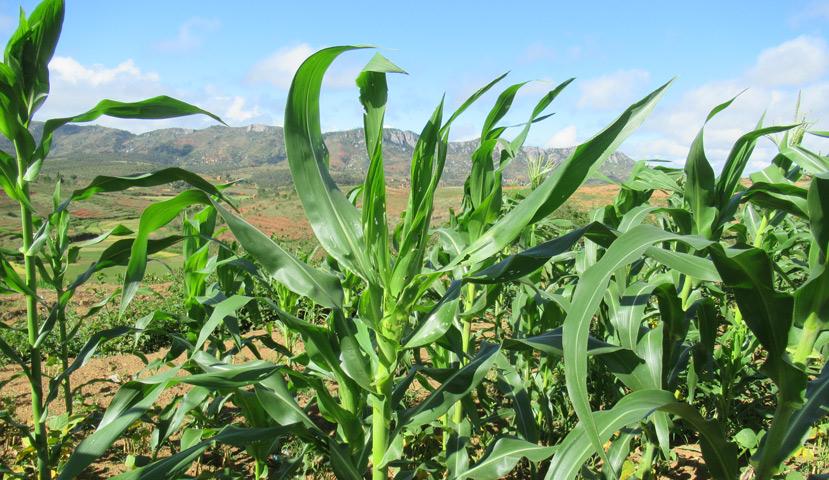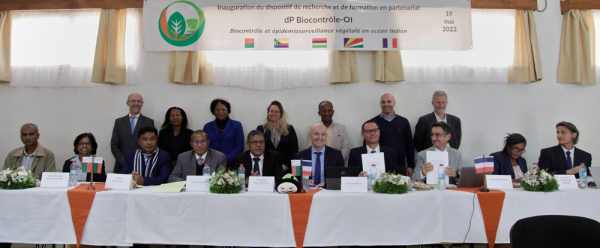Institutional news 4 February 2026
- Home
- CIRAD news
- News
- New platform in partnership research training Biological control
A new platform in partnership dedicated to epidemiological surveillance and biological pest control

Maize is widely cultivated in the Indian Ocean region, but is threatened by several pests and diseases © Hélène Delatte, CIRAD
In most of the Indian Ocean countries, agriculture plays a key role in the economy and is a major source of employment. Social demand for an agroecological transition towards more resilient and environmentally-friendly agriculture is also growing there.
Biological control can help to meet this demand. The techniques involved are aimed at controlling crop pests through the use of natural mechanisms. They include, for example, using macro- or micro-organisms, or chemical mediators such as pheromones, to repel crop pests without actually eradicating them. Biological control is based on the principle of managing systemic balances.
To address these challenges, CIRAD and its partners in the Indian Ocean are launching a new platform in partnership for research and training.
Our partners have expressed strong demand for biological control techniques to enable them to reduce insecticide treatments. Making progress towards the agroecological transition is one of their main reasons for this.
The Biocontrôle-OI platform in partnership for research and training (dP) has 11 partners:
- National Centre for Applied Research and Rural Development (FOFIFA), Madagascar;
- CIRAD;
- Institut National de Recherche pour l'Agriculture, la Pêche et l'Environnement (INRAPE), Comoros;
- Food and Agricultural Research and Extension Institute (FAREI), Mauritius;
- French Ministry of Food and Agriculture in Mayotte (SALIM);
- French Ministry of Food and Agriculture in Réunion (SALIM);
- Plant Protection Directorate, Madagascar;
- Ministry of Agroindustry and Food Security, Mauritius (Plant Protection Office);
- Seychelles Ministry of Agriculture;
- University of Réunion;
- University of Antananarivo.
This new dP will help to create stronger partnerships not only between research institutes and universities, but also with plant protection offices, which are actively involved in epidemiological surveillance.
It is structured around three focal areas:
- assessing regional priorities for plant health risks, in particular with an epidemiological surveillance component;
- developing biocontrol innovations;
- integrating these innovations into crop management systems and assessing their performance.
It builds on the PRPV network (regional plant protection programme) and strengthens it. This network has been operating in the south-west Indian Ocean since 2001 and brings together the main public and private organisations in this region.
The dP includes a training component, which is linked to the BEST (Biodiversity and Tropical Ecosystems) Masters course run by the research unit Plant Communities and Biological Invaders in Tropical Environments (PVBMT – CIRAD, University of Réunion).
It is involved in several ongoing projects, including:
- Santé & Biodiversité (Health & Biodiversity)
- DINAAMICC
- FOOD-SEC Semence
- GEMDOTIS
The main expected impacts of the dP are:
- Reduced synthetic pesticide use;
- Qualitative and quantitative improvements in crop production;
- Economic development in the sector;
- Improved territorial surveillance and warning and quarantine systems for plant health;
- Enhanced ecosystem sustainability towards the agroecological transition;
- Capacity building for students and professionals in scientific, economic and technical fields.
The dPs are a type of partnership launched by CIRAD to strengthen regional partnership dynamics and public and private research.
Each one is comprised of an alliance of partners established for the long term. They foster the development of a critical mass of researchers around a shared programme represented by a portfolio of projects.
The dPs are managed collectively by the partners. They are also open to civil society in order to facilitate impact as well as interactions with policymakers.



























